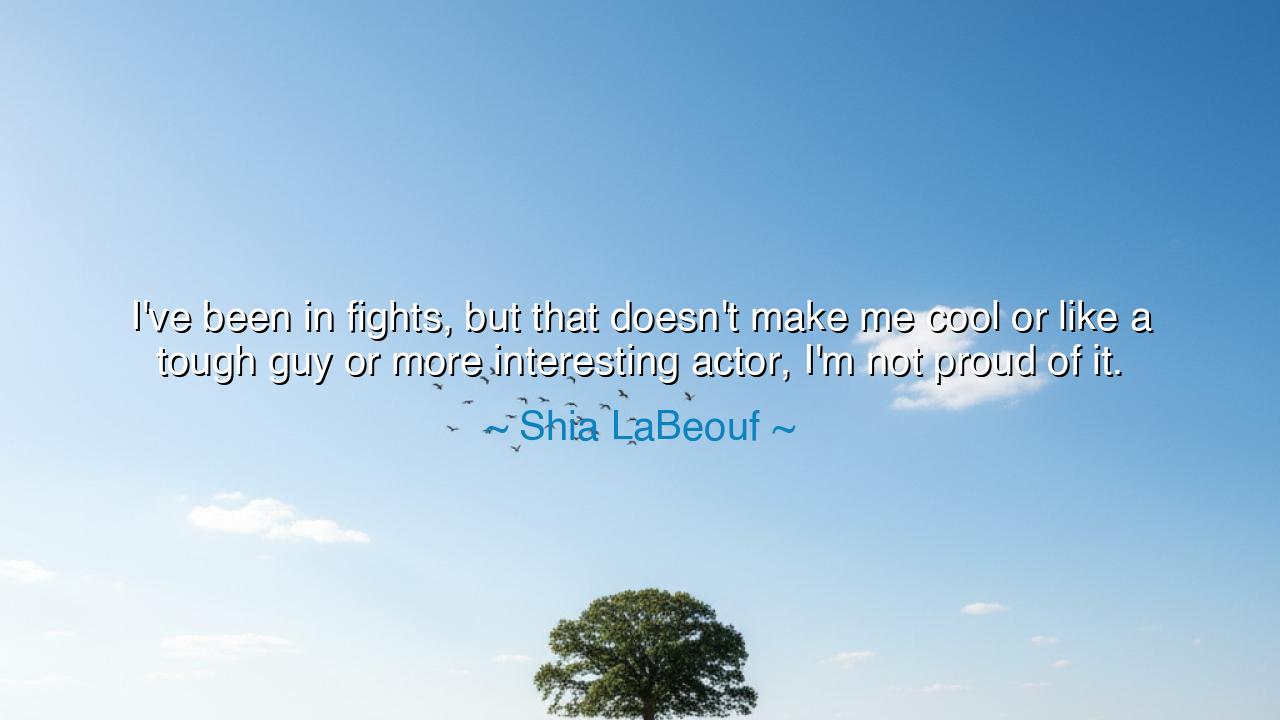
I've been in fights, but that doesn't make me cool or like a
I've been in fights, but that doesn't make me cool or like a tough guy or more interesting actor, I'm not proud of it.






In the ancient tapestries of human wisdom, there is often a truth that speaks to the essence of strength, honor, and the value of self-reflection. Shia LaBeouf, in his candid reflection, says, "I've been in fights, but that doesn't make me cool or like a tough guy or more interesting actor, I'm not proud of it." These words ring with the humility of one who has learned that true strength is not found in physical confrontation or aggression, but in the wisdom and self-awareness that come from understanding the deeper purpose of one's actions. In a world that often celebrates bravado and power, LaBeouf’s statement calls us to recognize the true nature of courage and honor.
The ancients understood this concept well. In Greek philosophy, the notion of virtue was deeply connected to inner strength and self-control. Aristotle, in his writings on ethics, believed that true courage was not in seeking battle, but in knowing when to act with restraint and wisdom. The truly courageous, according to Aristotle, were not those who engaged in physical confrontation to prove their worth, but those who could face fear and temptation with the calmness and resolve that came from inner strength. In this sense, LaBeouf’s words reflect an ancient wisdom: physical altercations, though they may be a part of one’s history, should not be sources of pride or ego. True strength lies in the ability to avoid violence and choose the path of peace and understanding.
In Roman history, the Stoics, including Seneca and Epictetus, often wrote of the power of inner control over external actions. They taught that a wise man is one who does not allow anger or pride to guide his actions, but instead acts in a manner that reflects virtue and honor. For them, physical violence was a sign of weakness rather than strength, a failure to control one’s emotions and impulses. The Stoic philosopher Marcus Aurelius often spoke of the importance of reflecting on one’s actions and ensuring that they aligned with righteousness, not fleeting pride. LaBeouf’s statement, in this context, becomes a recognition of the emptiness that comes with actions driven by pride and ego—a call to seek deeper forms of strength and self-control.
The story of Alexander the Great serves as a poignant example of the difference between true strength and the pursuit of external dominance. Alexander, despite his military conquests and undeniable courage, often struggled with his own internal battles—his pride, his anger, and his desire for glory. In his moments of reflection, Alexander realized that his greatest battles were not fought on the fields of war but within himself. True strength, as he came to understand, lay not in vanquishing enemies but in mastering his own impulses and desires. This inner struggle mirrors LaBeouf’s words—understanding that bravado and external displays of power, while perhaps admired by others, are not the true markers of a person’s worth.
In more recent history, the tale of Muhammad Ali offers a more modern reflection on strength and pride. Ali, known for his brash personality and famous “trash talk,” later reflected on his life, acknowledging the flaws and misguided pride that led him to engage in verbal and physical conflict. As he grew older, Ali became an advocate for peace and reconciliation, realizing that the true greatness in life lay not in being the most feared or adored, but in living with integrity and humility. Like LaBeouf, Ali’s story demonstrates the transition from youthful bravado to a deeper understanding of what it means to live with honor and purpose.
LaBeouf’s humility in acknowledging that fighting is not something to be proud of serves as a profound reminder that the true measure of a person’s strength lies not in their ability to dominate others but in their ability to master themselves. As Socrates once said, “Know thyself.” To understand that true power comes from within, from the ability to rise above anger, pride, and external pressures, is to understand the essence of true virtue. LaBeouf’s words invite us to reflect on our own actions, to ask ourselves whether we are motivated by a desire for recognition, or whether we act with integrity, striving to become the best versions of ourselves.
The lesson we must take from Shia LaBeouf’s words is one of self-awareness and restraint. Life does not measure us by the number of fights we engage in or the strength of our physical prowess. True strength is found in the way we respond to challenges, in the grace with which we handle adversity, and in the peace we cultivate within ourselves. In our own lives, we should seek to rise above the impulses that lead us into conflict and instead, choose the path of reflection, understanding, and self-mastery. Just as the ancients understood, let us recognize that true greatness lies not in our victories over others, but in our ability to conquer the turmoil within, and to move forward with wisdom, humility, and compassion.






AAdministratorAdministrator
Welcome, honored guests. Please leave a comment, we will respond soon